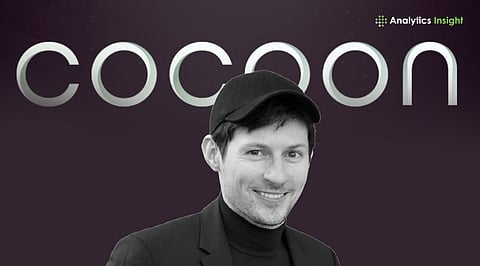

Pavel Durov, the founder of Telegram, has unveiled a project called Cocoon, which aims to restore privacy in the digital world. The announcement took place during the Blockchain Life 2025 event in Abu Dhabi, in front of a large tech-oriented audience.
Cocoon, an abbreviation for Confidential Compute Open Network, will take place on The Open Network (TON), a blockchain linked to the Telegram ecosystem. It allows users to share their idle computing power and receive Toncoin (TON) as a reward. Companies and developers can then access this network to run applications with high demand without relying on major cloud service providers.
The primary function of Cocoon is similar to that of a marketplace. Owners of graphics cards connect their computers, give away computing power, and get paid in Toncoin. Developers also pay with the same token to utilize that power. They create an open market together, which operates without the involvement of corporate intermediaries.
What makes Cocoon stand apart is its design for data protection. Every process that runs inside the network stays encrypted. Even those contributing computing resources never see the material they process.
This structure addresses one of today’s most significant digital issues - the exposure of personal data stored on large, centralized servers. Cocoon’s framework keeps all information secure, allowing tasks to run privately from start to finish.
Users can receive payment for the hardware's provided power, thus converting the computer's idle time into a new kind of economy. Rather than keeping data in large warehouses owned by a handful of companies, Cocoon shares the burden with those who voluntarily assist.
During his presentation, Durov spoke about the trade-off between comfort and control that has defined the internet age. “For twenty years, we’ve been trading freedom for convenience,” he said. “It’s time to build systems that let us keep both.”
Cocoon’s design aims to prove that shared networks can offer the same performance as centralized services while remaining transparent. Every action on the system can be verified publicly, reducing the risk of manipulation or hidden bias.
This idea challenges the power of large tech firms that hold both the data and the tools to process it. By placing control in the hands of users, Cocoon opens the door to a model where trust is built through code rather than contracts.
The question now is simple yet powerful: can a distributed model like Cocoon restore absolute control over our digital lives?
Telegram will be the first central platform to connect to Cocoon. The rollout is expected to start in November 2025, integrating through Telegram’s mini-apps and bots.
With more than one billion global users, Telegram’s participation could make decentralized computing widely accessible. Planned features include message summaries and writing tools that run entirely on Cocoon’s encrypted network.
Durov’s statement closed with a reminder of purpose rather than promotion. “We’ve watched centralized systems consume our privacy one algorithm at a time,” he said. “If freedom is to survive the next wave of technology, our systems must evolve differently.”
Pavel Durov’s Cocoon introduces a new model for privacy-driven computing on the TON blockchain. By rewarding GPU owners with Toncoin and enabling encrypted processing, it challenges centralized control of data. Telegram’s upcoming integration may soon bring this secure system to global users.
Read More: Telegram and Kraken Team Up to Bring Tokenized Stocks to Over 1 Billion Users
Join our WhatsApp Channel to get the latest news, exclusives and videos on WhatsApp
_____________
Disclaimer: Analytics Insight does not provide financial advice or guidance on cryptocurrencies and stocks. Also note that the cryptocurrencies mentioned/listed on the website could potentially be risky, i.e. designed to induce you to invest financial resources that may be lost forever and not be recoverable once investments are made. This article is provided for informational purposes and does not constitute investment advice. You are responsible for conducting your own research (DYOR) before making any investments. Read more about the financial risks involved here.
